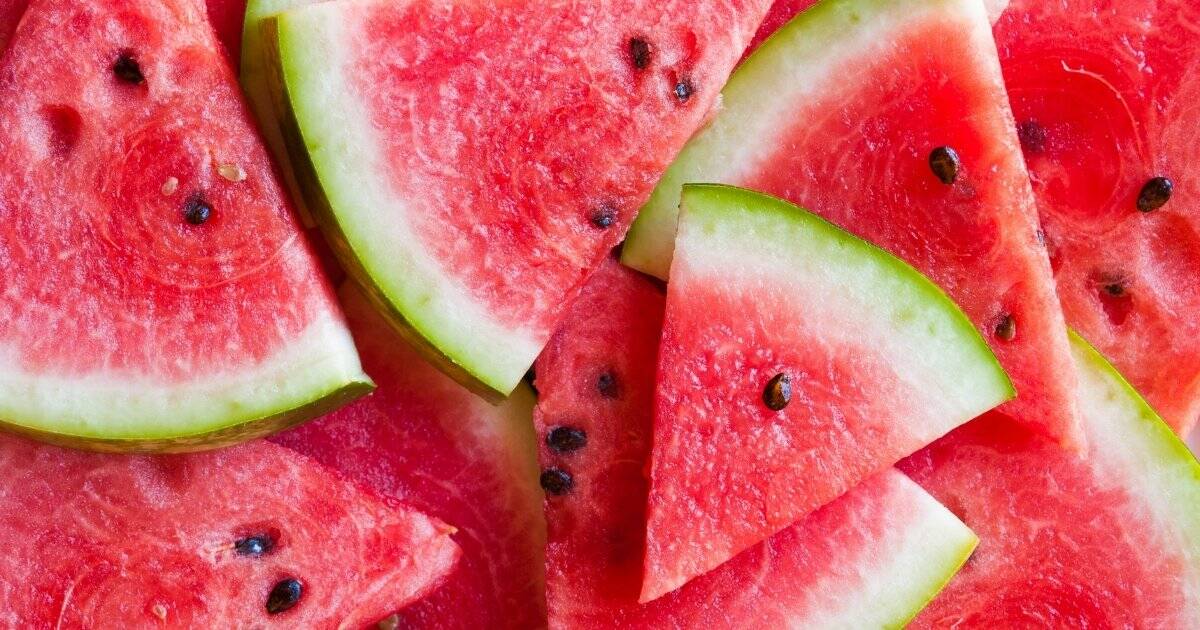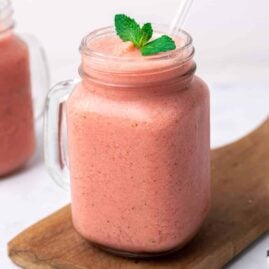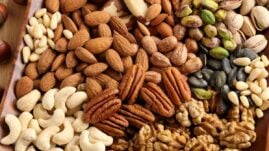There is sometimes nothing better than a refreshing slice of watermelon, especially on a hot afternoon.
The fruit is pretty much ubiquitous at family meals, BBQs, and social gatherings in the summertime, and is grown worldwide. In fact, there are over 1,000 different varieties of watermelon!
But what makes for a fun, refreshing snack for most people can have blood sugar consequences for people living with diabetes.
This article will outline the pros and cons of eating watermelon for people living with diabetes and how (and if!) you should incorporate this fruit into your life and daily diet.

What are the health benefits of eating watermelon?
Eating watermelon can have many benefits. Below are the health benefits to regularly consuming this pink, sweet fruit.
Full of vitamins and minerals
Watermelon contains a variety of vitamins and minerals, including potassium, magnesium, and vitamins A and C. It also has few calories for being a fruit, with only 46 calories per cup.
It is also extremely easy to bolus insulin for, as a cup of watermelon only has 11.5 carbohydrates.
The bright pink color indicates it is a rich source of antioxidants like carotenoids, lycopene, and cucurbitacin E that aren’t only good for you, but make you feel good, too!
May relieve muscle soreness and improve exercise performance
Watermelon also contains citrulline, an amino acid that may help improve exercise performance in athletes. Supplementing with citrulline can also help reduce muscle soreness in people who exercise.
How it works is that this compound helps to expand blood vessels, relieving the heart of extra exertion to pump blood throughout the body, thus improving exercise performance and recovery.
Watermelon is great because it provides not only citrulline, but also much-needed hydration during exercise.
One study gave three groups different concoctions: one with just watermelon juice, another with watermelon juice supplemented with extra citrulline, and a control drink. Both drinks that had watermelon juice in them experienced improved muscle soreness after exercise and improved heart rate recovery than the group that had the control drink.
Watermelon can also be good for people with diabetes, who when exercising, may require a low blood sugar snack. Watermelon provides just enough carbohydrates to help treat the low blood sugar, without overdoing it on the carbohydrates or sugar.
Plus, it’s a natural source of energy, with no added ingredients or chemicals.
May improve skin health
The vitamins found in watermelon are important for the health and maintenance of your skin. Vitamin C, when either eaten, drank, or applied topically, helps the body produce collagen, a protein that keeps hair strong and skin youthful and supple.
One study found a higher intake of Vitamin C was correlated with a lower chance of developing dry skin and wrinkles. Best yet, one serving of watermelon contains 14% of your daily recommended intake of Vitamin C!
Vitamin A is also very important for skin health, as it helps to repair damaged skin cells and create new ones. It also promotes wound healing.
One serving of watermelon contains 5% of your daily recommended intake of this vitamin.
May aid in digestion
In addition to its plethora of vitamins, minerals, and healthy antioxidants, watermelon contains 0.6 grams of fiber per serving, which is necessary for healthy digestion.
Water and fiber help food move through the bowels more easily, and including plenty of healthy fruits and vegetables in your diet can prevent diarrhea, constipation, and issues with digestion.
Eating fiber often can keep your bowel movements regular, too.
One study found that people who had low fluid and low fiber intake were more likely to suffer from constipation. All the more reason to include watermelon in your diet!
Another study found that eating watermelon was correlated with weight loss and feelings of satiety, which is a welcome sign for anyone looking to lose weight!
The downsides of eating watermelon
Eating watermelon may also have some downsides, especially if you have diabetes. Below are some of the reasons you may choose to avoid this fruit.
Watermelon is mostly carbohydrates
Although this sweet fruit provides a source of a variety of vitamins and minerals, there are no other macronutrients of note: watermelon is mostly carbohydrates, with no protein or fat.
This can make it a tricky food to eat if you have diabetes because foods that are solely carbohydrates tend to spike blood sugars faster.
In fact, watermelon has a glycemic index (GI) of 80, but because the carbohydrates are pretty low for a fruit, the glycemic load is only 5.
Pairing watermelon with a fatty or protein-rich side can help curb the quick rise in blood sugar that you may see when eating the fruit.
It is not very filling
Watermelon is so delicious, but it is not a very filling snack. This can lead people to overeat it pretty regularly. Keep in mind that a serving size of watermelon is one cup, which is equivalent to a one-inch-thick slice of a typical melon.
However, people tend to go back to seconds and thirds, because the fruit is over 90% water!
While one serving has 11 grams of carbohydrates, having 3 or more servings can turn this treat into a high-carbohydrate, high-calorie dessert pretty quickly.
It may cause cardiovascular problems
People who suffer from serious hyperkalemia (high potassium levels) should not eat more than one cup of watermelon per day.
Potassium is crucial for maintaining electrolyte function in the body, keeping muscles and bones strong, and for heart health.
However, if you already have high potassium levels, eating watermelon can cause an overabundance of potassium in the blood, causing a weak pulse rate, irregular heartbeats, and other cardiovascular problems.








twg
Never knew about watermelons containing carbohydrates.
used to eat a lot of them during the summers.
Ivan
As a type1, I eat watermelon weekly for the entire summer for the past 43 years and have perfect health along with zero complications